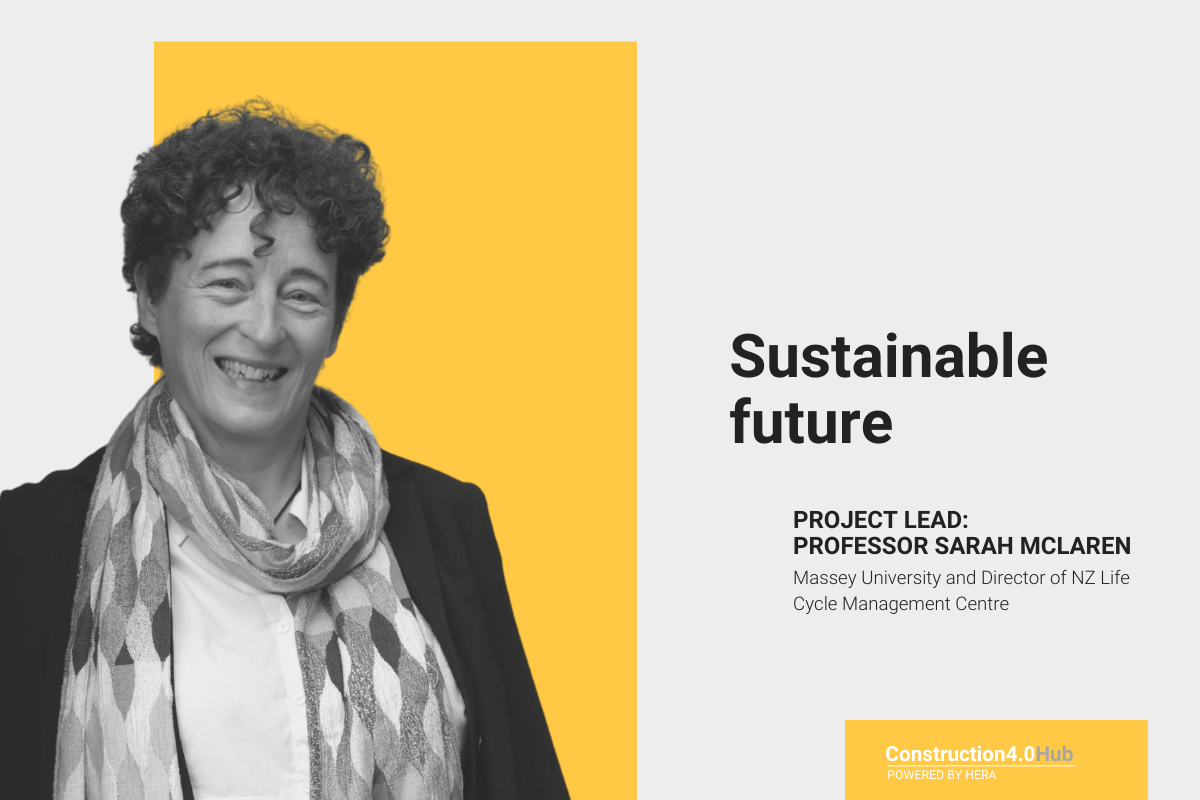Your cart is currently empty!


Building a sustainable future with Construction 4.0 transformation
In the sustainable future research theme of our Construction 4.0 project, we ensure that our transformation is environmentally sustainable.
In this research theme, existing greenhouse gas emission datasets (e.g. ecoInvent, BRANZ CO2NSTRUCT) for building materials and products will be adapted and extended to represent the NZ construction situation. They will be used to calculate the carbon footprint of the alternative prefabrication and modularisation solutions developed in RP1/2/3, and then compared with existing approaches using a whole-of-life whole-of-building modelling approach. Their performance will be calibrated against carbon budgets based on the 1.5∘C global mean surface temperature target. In other words, this will be about designs that enable us to meet our carbon budgets. The sustainable future research theme is led by Professor Sarah McLaren, Director of NZ Life Cycle Management Centre and expert in the relationship between LCA and decision-support. She is supported by Dr David Dowdell, Principal Scientist, BRANZ, Science Lead for the BRANZ “Transition to a Zero Carbon Built Environment” project. David developed NZ’s whole-building, whole-of-life framework and accompanying design-support tools.
This research will provide an environmental limits-based method for defining carbon targets for New Zealand buildings and structures utilising Construction 4.0 techniques, and assessing their potential contribution to climate change mitigation. A consumption-based whole-of-life approach will be used to define carbon targets in line with the building and construction sector being net-zero carbon by 2050. The method will be capable of transfer to an assessment of other technologies.
Building a sustainable future: planetary boundaries and thinking beyond embodied carbon
This research will build on existing research on downscaling planetary boundaries to NZ economic sectors, applying it to the construction sector. Existing carbon footprint datasets will be adapted to represent current and future Aotearoa New Zealand construction objects and processes, enabling measurement of the potential contribution of Construction 4.0 technologies to climate change mitigation.
Develop method for environmental limits-based carbon targets
Different climate change mitigation targets approaches (e.g. planetary boundaries, NZ government Zero Carbon policy) will be scaled between international, national, sector and individual building levels using alternative approaches (e.g. equal per capita, grandfathering) and evaluated for their applicability to the New Zealand construction sector and Construction 4.0 technologies.
Life cycle-based climate change impact of current construction objects and technologies, and proposed Construction 4.0 alternatives
Climate change analysis (based on Life Cycle Assessment) will be undertaken of the current situation for selected construction objects and technologies, and modelled at different scales ranging from individual buildings to regional/national level. The climate change analysis will then be applied, using scenario techniques, to the Construction 4.0 alternatives.
Carbon footprint data integration into technology transfer at design, construction and monitoring stages
Working closely with the other research programs and themes, the climate change impact results and associated targets will be integrated into the data management and technology transfer tools.Benchmarking will be used to communicate the scale of change possible through uptake of the different technologies.
For the sustainability assessment, methodology will utilise an environmental limits framework, building on the planetary boundaries concept and downscaling it appropriately to the Aotearoa New Zealand construction sector. The current carbon footprint of the case study buildings/structures will be calculated using New Zealand-datasets compiled by BRANZ, for example, LCAQuick and BRANZ CO2NSTRUCT. Then the anticipated improvements due to adoption of Construction 4.0 techniques will be estimated following the approach developed by McLaren and Dowdell (Chandrakumar et al., 2020a, 2020c; Chandrakumar and McLaren, 2018b; McLaren et al., 2020).
The two sets of results will be compared with the calculated limits-based carbon footprint for the same buildings/structures.
As always – we are here to answer any questions that you have, so please feel to reach out to any of the named researchers or myself at troy.coyle@hera.org.nz.
